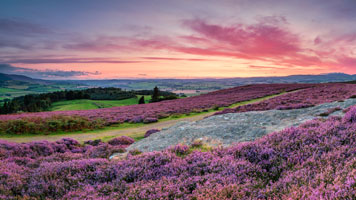'Volunteers around the UK are helping us collect samples of plants,' says Professor Nick Kettridge
We have all seen the consequence of extreme wildfires within the UK, risking homes, impacting our ecosystems and polluting our air. The UK experiences over 30,000 wildfires each year. Shrubs are important fuel for these wildfires. The drier the vegetation, the more flammable the fuel, and the greater the number, size and consequences of these wildfires.
 If we know in advance where the driest areas are, we can take preventative action. We are developing the scientific base needed to build an effective, tailored UK fire danger rating system, with the support of the UK’s Natural Environment Research Council. We need your help to supplement our continuous monitoring with a citizen science survey in spring 2023 of how much moisture is in plant samples.
If we know in advance where the driest areas are, we can take preventative action. We are developing the scientific base needed to build an effective, tailored UK fire danger rating system, with the support of the UK’s Natural Environment Research Council. We need your help to supplement our continuous monitoring with a citizen science survey in spring 2023 of how much moisture is in plant samples.
Volunteers are taking samples of heather near them during spring 2023
We are using common heather (Calluna vulgaris) as our standard plant for this survey; this beautiful shrub grows on heathlands and peatlands across the UK. Volunteers will receive a sampling kit by post, then be asked to collect a small sample of live heather in their local area during dry weather in spring 2023. Videos and further information on how to sample will be provided.
Professor Nick Kettridge will then analyse how much moisture is in the samples you collect and share with you the key project messages and outcomes. The results from the project will be used to help develop a system to warn local areas of dangers so they can better manage wildfires. The research will be published in academic research papers/conferences, so other projects can use the knowledge to help protect our environment.
 Our green spaces need your protection
Our green spaces need your protection
'Citizen science projects like this are an environmentally friendly way of collecting key information across a whole country, with samples collected by people who know their local area. The Great Fuel Moisture Survey will analyse how vulnerable each place is to wildfires, helping to develop a fire danger rating that can be used to prioritise prevention measures when and where they are needed most.’
Professor Nick Kettridge, Professor of Ecohydrology
Results coming soon
Check back later in 2023 for the results.